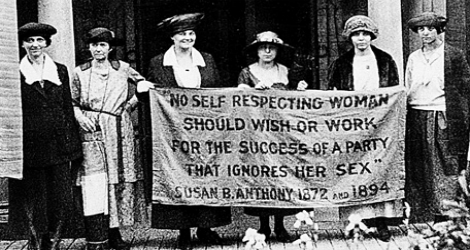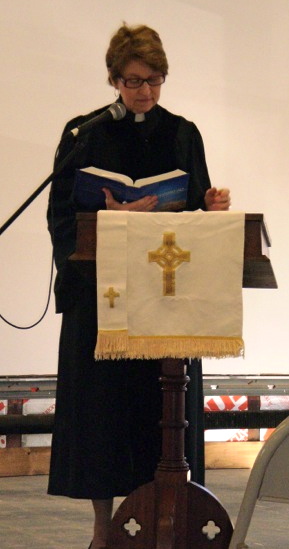Political rhetoric is always about power. As a woman listening to current political rhetoric, I am convinced that the political contest among some has been framed to gain power over American women. The gains for American women to full citizenship and full moral agency made through great struggle over the past 90 years are threatened.
My Republican grandmother and great-grandmother were suffragists from central New York. In the early 20th century, the two of them—dressed in their best dresses, hats, and gloves, and armed with calling cards—knocked on doors, circulated petitions, and argued for their right to vote. They and their suffragist allies organized from the basement of the local Presbyterian Church. My grandfather fully supported their efforts.
Organizing for the right to vote in a place of prayer makes perfect sense when one considers the etymology of the word “suffrage,” which means both “to vote” and “to pray.”[1] Indeed, in a representative democracy when citizens vote, they are in a very real sense praying for their values to be carried forward as policies by the individuals for whom they vote. The democratic process has a spiritual component. The effort to suppress voting in some states is, to my mind, a much greater threat to religious freedom than the state requiring insurance coverage from all institutions that accept public funding.
At the moment, women voters are being asked to pray for their own return to silence and certainly more frequent pregnancies. One is tempted to ask whether the next suggestion will be for women to cover their heads as well? It’s biblical, after all: see Paul’s first letter to the church in Corinth, chapter 14. One wonders whether a certain segment of the American male population has become secretly envious of those cultures where women are veiled, or can’t drive, or are excluded from civic power.[2] Perhaps it’s simply racist: based on fear that white women are not having enough babies?
___________________________________________
Political rhetoric is always about power. As a woman listening to current political rhetoric, I am convinced that the political contest among some has been framed
to gain power over American women.
___________________________________________
On the first day of seminary, I was taught that “a text out of context is a pretext,” particularly when interpreting the Bible. Over three years the seminary faculty worked diligently to teach seminarians how to interpret the scriptures in their original languages of Hebrew and Greek in order to preserve the complexity of the text in its contexts, first and succeeding. At the least, much current political rhetoric makes use of inadequate biblical interpretation; e.g. abortion is never explicitly mentioned in the Bible. Other “texts” must also be interpreted within their contexts: each pregnancy is unique, just as each woman is, and none should be taken out of a context of women’s healthcare.
Are religious people, particularly from my faith tradition as a Christian, taught to seek and exercise power over? Not by the one to whom the gospels point. He returned to Jerusalem to confront the ones who had power over him. And he lost, even as he pointed to the One who, as the source of power, wants power used for neighbor love and justice. As a matter of faith, that Holy One who wants love and justice for all made sure Jesus’ presence returned as a certification of the divine vote.
We all vote our values; that is, everyone votes their “faith.” We also “pray” our values. American women and men need to honor women’s history as citizens and moral agents in their voting and their praying during this election season.
Get Involved
- Presbyterians Affirming Reproductive Options (PARO), a network of PHEWA
- The Advocacy Committee for Women’s Concerns (ACWC), Presbyterian Church (U.S.A.)
- UniteWomen: Equality for All
- National Organization for Women (NOW)
Notes
[1] Oxford English Dictionary.
[2] This is not to imply that veiling necessarily signifies oppression. Women, who choose the veil, often express feeling “liberated from what they [have] experienced as the intrusive, commodifying, basely sexualizing Western gaze”. See, for instance, Naomi Wolf’s article, “Behind the veil lives a thriving Muslim sexuality.” The determining factor of course is the presence, or lack, of choice.
– – –
Bebb Stone has served for 25 years as a Presbyterian Minister of Word and Sacrament as a member of Pittsburgh, Elizabeth, and Albany presbyteries. Currently she serves as the Interim Minister of the Schoharie United Presbyterian Church, which is, along with the entire Village, recovering from being under 6 feet of water after Hurricane Irene last August. Bebb is President of PHEWA, the Presbyterian Health Education and Welfare Association, a network of ministry networks called into being by policy votes of the General Assembly. She has published one book: Second Isaiah’s Daughters, University Press of America, 2004.









Pingback: DEAR HOUSE…. | United Nations Delegate